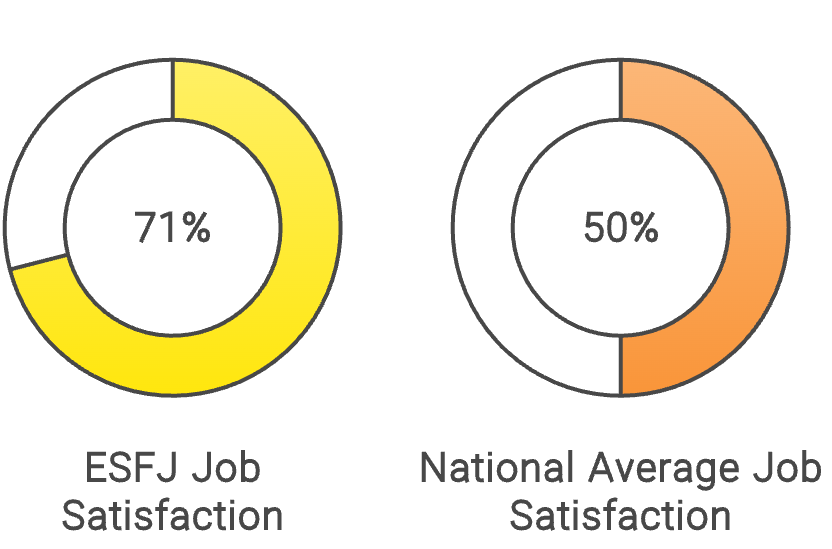How to attract and assess Caregiver (ESFJ) candidates during the hiring process


In today's dynamic job market, understanding personality types can be a game-changer for recruiters and hiring managers. Among these, the ESFJ (Extraverted, Sensing, Feeling, Judging) personality type stands out as a valuable asset to many organizations. ESFJs, often called "The Caregivers" or "The Providers," make up approximately 12% of the population, making them one of the more common personality types.
According to recent studies, ESFJs consistently rank among the top personality types in job satisfaction, with 71% reporting high levels of contentment in their careers. This satisfaction often translates into loyalty, with ESFJs having an average job tenure of 5.2 years, compared to the national average of 4.1 years.

Furthermore, in a survey of Fortune 500 companies, 68% of HR managers reported that employees with ESFJ traits were among their top performers in customer-facing roles and team-oriented positions. Their natural inclination towards harmony and cooperation has been linked to a 23% increase in team productivity in collaborative environments.
However, identifying and effectively assessing ESFJ candidates requires a nuanced approach. This blog post will guide you through the process of recognizing ESFJ traits, crafting appropriate interview strategies, and creating an inclusive hiring process that allows these potentially valuable team members to shine.
ESFJ Candidates: Key Strengths, Limitations, and Personality Traits
ESFJs, also known as "The Consul" or "The Provider," bring a unique set of characteristics to the workplace. Understanding these traits can help both employers and ESFJ individuals maximize their potential in professional settings.
Key Strengths:
Strong Interpersonal Skills
- Naturally empathetic and attuned to others' emotions
- Excellent at building and maintaining relationships
- Skilled at creating harmony in group settings
Organizational Abilities
- Adept at managing schedules, tasks, and projects
- Detail-oriented and thorough in their work
- Capable of creating and maintaining efficient systems
Reliability and Responsibility
- Highly dependable and committed to their duties
- Strong work ethic and sense of duty
- Consistently meet deadlines and fulfill obligations
Practical Problem-Solving
- Able to find concrete, real-world solutions to issues
- Good at implementing established procedures effectively
- Skilled at addressing immediate, tangible problems
Cooperative Team Players
- Thrive in collaborative environments
- Willing to support colleagues and contribute to team goals
- Able to foster a positive team spirit
Strong Communication Skills
- Clear and effective communicators, both verbally and in writing
- Good at explaining complex ideas in understandable terms
- Skilled at facilitating discussions and meetings
Limitations:
Difficulty with Abstract Concepts
- May struggle with highly theoretical or conceptual work
- Prefer concrete, practical applications over abstract ideas
Sensitivity to Criticism
- Can take negative feedback personally
- May have difficulty separating constructive criticism from personal attacks
Resistance to Change
- Prefer established routines and procedures
- May be hesitant to embrace new, untested methods
Tendency to Avoid Conflict
- May prioritize harmony over addressing necessary conflicts
- Can struggle with delivering negative feedback or making unpopular decisions
Potential for Overcommitment
- May take on too many responsibilities in their desire to help others
- Can struggle with work-life balance due to their strong sense of duty
Difficulty with Ambiguity
- Prefer clear guidelines and expectations
- May feel uncomfortable in situations with unclear rules or structures
Personality Traits:
Extraverted
- Energized by social interaction
- Enjoy working in team environments
- Communicate thoughts and ideas openly
Sensing
- Focus on concrete facts and details
- Prefer practical, real-world applications
- Trust personal experience over abstract theories
Feeling
- Make decisions based on personal values and how they affect others
- Prioritize harmony and the well-being of people
- Empathetic and considerate of others' emotions
Judging
- Prefer structure and organization
- Like to plan ahead and follow schedules
- Derive satisfaction from completing tasks and projects
Additional Traits:
- Warm and friendly demeanor
- Strong desire to be helpful and supportive
- Traditional in their outlook and values
- Conscientious and hardworking
- Loyal to their organization and colleagues
- Attentive to social norms and expectations
What ESFJ applicants look for in a workplace
- Collaborative environment: ESFJs are natural team players who thrive on social interaction. They seek workplaces that encourage teamwork, open communication, and shared decision-making. Group projects, brainstorming sessions, and collaborative problem-solving opportunities are highly appealing to them.
- Clear structure and expectations: ESFJs appreciate well-defined hierarchies, clear reporting lines, and explicit job descriptions. They perform best when they understand their role within the organization and have a clear set of goals and objectives. Regular feedback and performance reviews help them feel secure in their position.
- Opportunities to help others: ESFJs are driven by a desire to make a positive impact on others' lives. They are drawn to roles in customer service, healthcare, education, or human resources where they can directly assist and support people. Companies with strong corporate social responsibility programs also appeal to their helping nature.
- Positive atmosphere: A harmonious work environment is crucial for ESFJs. They seek workplaces with a friendly, supportive culture where conflicts are resolved constructively. They appreciate employers who prioritize employee well-being and organize team-building activities or social events.
- Recognition and appreciation: ESFJs are hardworking and loyal employees who value acknowledgment for their efforts. They thrive in environments that offer both formal recognition programs (like employee of the month awards) and informal appreciation (such as verbal praise or thank-you notes from colleagues or supervisors).
- Stability and security: ESFJs tend to be risk-averse and prefer established organizations with a track record of stability. They value job security, consistent work schedules, and clear career progression paths. Benefits such as health insurance, retirement plans, and paid time off are important to them.
- Chances for personal growth: While valuing stability, ESFJs also seek opportunities for professional development. They appreciate employers who offer training programs, workshops, or tuition reimbursement for further education. The chance to take on new responsibilities or advance within the company is motivating for them.
- Ethical practices: ESFJs have a strong moral compass and are drawn to organizations with integrity. They look for companies with transparent business practices, a commitment to diversity and inclusion, and a positive reputation in the community. Corporate values that align with their personal beliefs are important to them.
- Work-life balance: As individuals who value their personal relationships and family life, ESFJs appreciate employers who respect boundaries between work and personal time. Flexible work arrangements, reasonable overtime expectations, and policies that support work-life balance (such as parental leave or wellness programs) are attractive to them.
- Mentorship opportunities: ESFJs value guidance and support in their professional development. They are drawn to workplaces that offer formal mentorship programs or encourage informal mentoring relationships. The opportunity to learn from experienced colleagues helps them feel supported and enhances their sense of belonging within the organization.
- Structured onboarding: ESFJs appreciate a thorough and well-organized onboarding process. This helps them feel welcome, understand company culture, and quickly integrate into their new role.
- Opportunities for social impact: Beyond their immediate job responsibilities, ESFJs are often attracted to companies that allow them to contribute to broader social causes, such as through volunteer programs or partnerships with non-profit organizations.
How to assess an ESFJ-type candidate
- Focus on interpersonal skills: Use behavioral questions to evaluate their ability to work in teams and handle social situations.
- Assess organizational abilities: Present scenarios that test their capacity for planning and maintaining order.
- Evaluate emotional intelligence: Look for signs of empathy and ability to read and respond to others' emotions.
- Check for attention to detail: Include tasks or questions that require careful observation and precision.
- Gauge adaptability: Explore how they handle change and unexpected situations.
- Explore their motivations: Ask about what drives them and how they prefer to be recognized for their work.
- Assess communication style: Pay attention to how they express themselves and relay information.
- Use situational judgment tests: Present workplace scenarios to evaluate their decision-making process.
- Look for signs of loyalty and commitment: Inquire about their long-term career goals and past job tenures.
- Evaluate conflict resolution skills: Ask how they've handled disagreements or difficult personalities in the past.
ESFJ Careers: Best Fits
ESFJs thrive in careers that leverage their empathy, organizational skills, and desire to help others. Here are some of the most suitable career options for this personality type:
- Elementary School Teacher: Allows ESFJs to nurture young minds and create structured learning environments
- Human Resources Manager: Utilizes their people skills and ability to create harmonious work atmospheres
- Registered Nurse: Combines their caring nature with practical, hands-on patient care
- Event Planner: Taps into their organizational abilities and attention to detail
- Social Worker: Enables them to directly impact individuals and families in need
- Customer Relations Manager: Leverages their natural talent for understanding and assisting others
- Corporate Trainer: Allows them to support others' growth in a structured business setting
- Nonprofit Program Coordinator: Combines their organizational skills with their desire to contribute to society
These careers specifically cater to ESFJs' strengths in interpersonal communication, organization, and desire for structure, while also satisfying their need to make a positive impact on others and their community.
Career Paths to Avoid for ESFJs
While ESFJs can adapt to various roles, some career paths may be less suitable for their personality:
- Solitary work environments (e.g., data entry, night security)
- Highly analytical or abstract roles (e.g., research scientists, statisticians)
- Jobs with frequent conflict (e.g., debt collectors, crisis negotiators)
- Careers requiring constant change or unpredictability (e.g., day traders, emergency responders)
- Roles with little human interaction (e.g., remote software developers, technical writers)
- Jobs that go against their values or require manipulating others
- Highly competitive environments (e.g., cutthroat sales, investment banking)
- Careers with unclear structures or expectations (e.g., startup founders, abstract artists)
While ESFJs can succeed in these fields if passionate, they may find them more challenging or less fulfilling than roles aligning with their natural strengths and preferences.

FAQs
How can you identify ESFJ traits during the hiring process?
To identify ESFJ traits, look for candidates who emphasize teamwork, show strong interpersonal skills, express a desire to help others, and demonstrate attention to detail in their application materials and interviews.
What interview questions are effective for assessing ESFJ applicants?
Effective questions for ESFJ applicants might include: "Describe a time you worked in a team to solve a problem," "How do you handle conflicts with coworkers?", and "What motivates you in a work environment?"
Are there any specific challenges in hiring ESFJ candidates?
Challenges in hiring ESFJ candidates can include ensuring they're not overlooked in favor of more outwardly assertive personalities, and accurately assessing their technical skills which they may understate due to modesty.
What type of assessment tools work well for ESFJ applicants?
Assessment tools that work well for ESFJ applicants include situational judgment tests, role-playing exercises, and personality assessments that measure emotional intelligence and interpersonal skills.
How can you create an inclusive hiring process for ESFJ candidates?
Create an inclusive hiring process for ESFJ candidates by emphasizing collaborative aspects of the role, providing clear information about the company culture, and offering opportunities for them to demonstrate their interpersonal and organizational skills.
What are some potential biases to be aware of when assessing ESFJ applicants?
Potential biases when assessing ESFJ applicants include undervaluing their supportive nature in leadership roles, overlooking their problem-solving abilities due to their focus on people, and assuming they lack assertiveness or decision-making skills.

